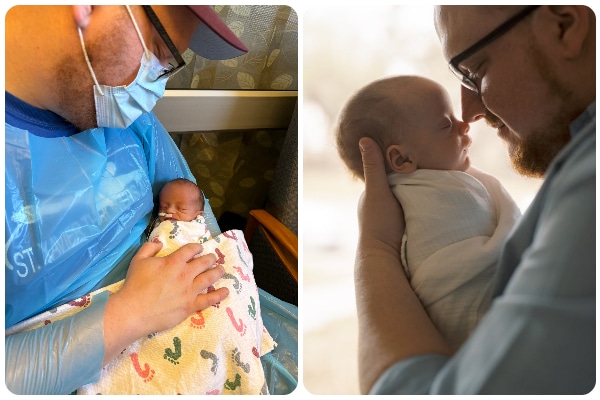Rachel Leeker was pregnant with her first baby last summer when her blood pressure skyrocketed and she needed critical care for herself and her baby at Methodist Dallas Medical Center.
Diagnosed with preeclampsia, Rachel’s blood pressure rose so high that doctors had to deliver baby T.J. by cesarean section just past 34 weeks, which led to a 22-day stay in the hospital’s neonatal intensive care unit (NICU).
“He was only 4 pounds, 1 ounce when he was born,” Rachel recalls.
It was a challenging delivery on top of an already difficult pregnancy. But Rachel had the support of a level III NICU and maternal care unit at a hospital capable of treating a wide range of critical conditions.
“I knew I was in good hands,” she says. “I knew they would do everything they could for me at that stage.”
RISK TO MOM AND BABY
Rachel was four months pregnant in August 2023 when she was diagnosed with preeclampsia, which placed her at greater risk of premature delivery, as well as strokes, heart attack, and organ damage.
It was a sobering diagnosis at an exciting time for Rachel and her husband, Adam.
“We were thrilled to be able to bring a new kid into the family,” says Rachel, whose biggest issue in the beginning was severe morning sickness, known as hyperemesis gravidarum. “For the most part, it was a very healthy pregnancy early on. But around 24 weeks, I started having blood pressure issues.”
She sought help from Diane Huynh, DO, OB-GYN on the medical staff at Methodist Dallas, who gave Rachel a steroid to help T.J.’s lung development in case he did arrive early and recommended she come in for weekly ultrasounds and lab work. She also instructed Rachel to keep tabs on her blood pressure and watch out for persistent headaches, abdominal pain, or spots in her vision.
Rachel knew what was at stake after working with expecting mothers every day as a medical assistant at the Golden Cross Academic Clinic. About 33 weeks into her pregnancy, she became concerned that T.J. wasn’t growing like he should.

“I was still really sick the whole time,” Rachel explains. “I actually only lost weight in my pregnancy. At that point, I had lost over 12 pounds.”
AN ESSENTIAL REFERRAL
Dr. Huynh referred Rachel to Margaret Warren, DO, maternal-fetal medicine specialist on the medical staff at Methodist Dallas.
“I was very familiar with her just because we have all of our patients at the clinic see Dr. Warren, and I knew my patients loved her,” Rachel says. “She confirmed that he was growth-restricted and said that can happen with preeclampsia. It can cause issues with the placenta, which can affect the baby’s growth.”
Dr. Warren advised Rachel to start the induction process once she hit her 37th week of pregnancy, rather than waiting out the full 40-week term — a standard practice in cases like Rachel’s.
From first-time moms to high-risk pregnancies, Methodist delivers family-centered support every step of the way. Learn more at MethodistHealthSystem.org
HEADING OFF ECLAMPSIA
But just two days after seeing Dr. Warren, on Christmas Eve, Rachel felt a “blinding headache.” When she checked her blood pressure, the reading showed it had surpassed 180 mm of mercury, a record high for her. At the advice of her physician, she headed to Methodist Dallas to get checked out.
Doctors administered a magnesium IV drip to help lower Rachel’s blood pressure but decided her best option was to begin the induction process immediately.
“Preeclampsia can develop into eclampsia, which is when maternal seizures develop,” Dr. Huynh explains. “We started administering magnesium sulfate to prevent eclampsia. There is also a concern for maternal liver injury, kidney injury, hypertensive strokes, and pulmonary edema.”
JOYFUL DELIVERY
When 36 hours passed with little progress, Rachel’s plans changed once more and she was taken to the operating room for a C-section. Just after noon on Dec. 26, 2023, little T.J. was born at just over 4 pounds.
“The biggest concerns with a 34-week delivery generally include neonatal respiratory failure and feeding difficulties,” Dr. Huynh says. “So T.J. needed NICU care and respiratory support immediately after delivery.”
While doctors and nurses cared for her newborn son, Rachel had to focus on her own recovery. During this time, she says, the medical team showed “amazing” sensitivity in light of the situation, especially as T.J. remained at the hospital for about three weeks, while she was discharged after eight days.
“The NICU staff were incredible. We got updates from his nurse practitioner every day. If something significant had changed, we always knew about it,” Rachel says. “Our nurses did a really great job of just leveling me out and reminding me this is temporary.”

‘AN AMAZING FIGHTER’
Rachel describes the day she and Adam took T.J. home as “so special.”
“It was such an amazing morning,” she says. “He was discharged in the morning and we got to just go home and enjoy him.”
T.J. was still less than 5 pounds when he left Methodist Dallas, but in four months, he virtually doubled his weight. Rachel says the entire family has been excited to have him home.
“He’s been such an amazing fighter … he has overcome a lot of obstacles,” adds Rachel, who returned to Methodist Dallas in May to celebrate the hospital’s annual NICU reunion party. “We got to see all his nurses and all the people who took such amazing care of him. I wanted them to see how big he’d gotten.”
Meeting other former NICU babies and their families was a bonus, Rachel says.
“It was so rewarding and gave me so much peace,” she says. “It just made me feel so calm about the fact that all of these babies were given such amazing care — to look where they are now and know we’ll be in their position at some point.”






